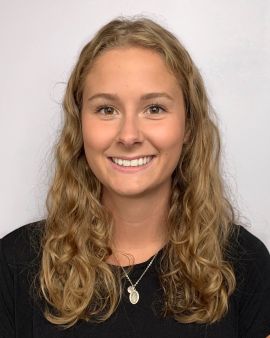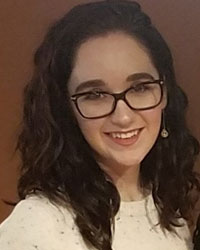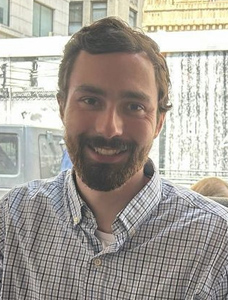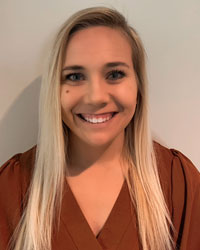
MS Student, Giszter Lab
apb323@drexel.edu
Education:
Andrey graduated magna cum laude with a bachelor of science and bachelor of arts from Belmont University in 2013 with majors in neuroscience and German. He entered into the Drexel University graduate program in fall 2017 pursing an MS in neuroscience.
Current research:
Investigating neurorobotic rehabilitation strategies to promote motor function recovery and to access spinal cord reorganization after spinal cord injury with Dr. Simon Giszter and his lab team.
Research interests:
Spinal cord injury, neuroengineering, neuroprosthetics, neurorobotics, brain machine
interface, neuromechanics, neurorehabilitation.
MD/PhD Student, Gao Lab
ltf28@drexel.edu

PhD Student, Detloff Lab
gag52@drexel.edu
Education:
Grace graduated as a research scholar with a Bachelor of Science in Biology from Texas A&M University in the spring of 2022 with a major in biology and minors in psychology and neuroscience. Prior to joining the Detloff lab, Grace trained with Dr. Jim Grau at Texas A&M University where she investigated pain after traumatic brain injury. Grace joined the Drexel University Neuroscience Graduate Program in fall 2022 and joined the lab of Dr. Megan Detloff, where she is completing her thesis work.
Current research:
Individuals with spinal cord injury (SCI) experience a variety of motor, sensory, and neuroimmune challenges after injury, with 65-85% of individuals reporting chronic pain. Currently, there are no effective FDA approved treatments for the treatment of neuropathic pain after SCI. However, a growing body of literature implicates neuroimmune interactions in the initiation and maintenance of chronic pain after SCI. Because pain is a multifaceted experience, involving both sensory discriminative and affective aspects, the Detloff lab addresses these neuroimmune interactions along the sensory neuroaxis, with a particular interest in the dorsal root ganglia. Grace hopes to bridge the gap between behavior, nociceptor, and immune cell activity to better understand the various aspects of chronic pain and harness the potential of neuroimmune modulation in order to ameliorate chronic pain after SCI.
Research interests:
Neurotrauma, spinal cord injury, pain, neuroplasticity and neuroimmune modulation.

PhD Candidate, Baas Lab
sg3536@drexel.edu
Education:
Shrobona is currently a PhD Candidate in the Neuroscience program working in Dr. Peter Baas’s Lab at Drexel University. She earned an MS in biotechnology from St. Xavier’s College, Kolkata. in India and she worked on the neuronal circuit development of zebrafish for a year at IISER Pune.
Research:
In the Baas Lab, Shrobona's primary research focus is on understanding establishment and preservation of neuronal microtubule array all throughout development. Her project will focus on the role of mitotic motor proteins in the regulation of the dynamic behaviors of the microtubule cytoskeleton. Microtubule dynamics are involved in neuronal processes like growth cone turning, axon guidance, neuronal migration and maturation.
Research interests:
Microtubule, motor proteins, neurodevelopment, neurogenesis.

PhD Student
aah347@drexel.edu
Education:
Adam holds a BS in neuroscience and psychology. He is a first-year student on a PhD track.
Research:
Adam is interested in the factors that contribute to regeneration and functional recovery in the spinal cord after injury.

PhD Student
jrm472@drexel.edu
Education:
I have a bachelor of science in behavioral neuroscience with a minor in psychology from Lehigh University. I am a first-year PhD Student.
Research interests:
I am most interested in neurodegenerative diseases but have interests in addiction and the reward pathway as well.

PhD Student, Wang Lab
ano43@drexel.edu
Education:
Ashley graduated with a BS and honors from the University of Scranton in 2017 with a double major in neuroscience and biology and a minor in biochemistry. She joined the department in fall 2017 as a research assistant in the Wang Lab and began the graduate program in fall 2019, remaining in the Wang Lab to pursue a PhD in neuroscience.
Research:
Ashley is interested in how brain oscillations and unique patterns of neural ensemble activity can initiate and influence the process of memory consolidation in mice, which occurs during sleep. She utilizes extracellular electrophysiology and optogenetics in freely behaving mice to determine the neural mechanisms that store our long-lasting memories. She hopes to expand our understanding of how the brain integrates experiences to properly respond to our environment, which can have a wide impact on amnestic, psychiatric, pathological and addiction disorders.
Research interests:
Learning, memory, memory consolidation, sleep neurobiology, systems neurobiology, information processing.

PhD Student, Barson Lab
bep46@drexel.edu
Education:
Breanne earned her BS in neuroscience and Spanish from Moravian College in Bethlehem, Pennsylvania, in 2013 and her MS in neuroscience from Drexel University in 2020, before transitioning to the PhD program.
Research:
Breanne’s research focuses on the role of the kappa-opioid receptor system in voluntary alcohol drinking and its subregional differences within the nucleus accumbens of rats. Classically, this receptor system and its ligand, dynorphin, have been understood to have dysphoric effects and enhance alcohol drinking; however, this project explores how, in the rostral subregion, activation of these receptors can suppress alcohol drinking. Future projects will explore how this effect may change with the development of dependence.
Research interests:
Ethanol use, nucleus accumbens subregions, kappa-opioid receptors, microinjections .

PhD Student, Giszter Lab
tss72@drexel.edu
Education:
Trevor received his BS in biology from Northwest Nazarene University in 2015. Before coming to Drexel to pursue his PhD, he worked for two years as an intramural research trainee fellow at the NIH. He is a graduate student in the laboratory of Dr. Simon Giszter.
Current research:
Trevor's research focuses on the spinal cord's intrinsic capacity to structure and pattern movement. Owing to their unique physiology, frogs can chronically survive spinalization while retaining a repertoire of reflexes. Motor control within this model appears to be simplified to the activation of a handful of independent elements, motor modules, which recruit the appropriate muscle synergies. The mechanisms of module recruitment and the neurobiological basis for modules remains largely unknown. Understanding these mechanisms will clarify the role of supraspinal centers in motor control and may guide rehabilitation for motor deficits after disease or injury.
Research interests:
Spinal cord injury, neuroengineering, sensorineural integration, comparative motor control.

PhD Student, Detloff Lab
njs83@drexel.edu
Education:
I earned a BS in neuroscience and a BA history from the University of Delaware. I started in the MS program in Neuroscience at Drexel in 2016 with Dr. Dougherty and graduated in 2018. After a year as a technician with Dr. Dougherty, I entered the PhD program with advanced standing as a third-year candidate. I will complete my thesis project under Dr. Dougherty's mentorship.
Current research:
Accessing spinal central pattern generator circuitry to restore hindlimb motor function after complete spinal cord injury (SCI) in mouse. I am implementing epidural stimulation with viral therapy to promote post-SCI recovery and investigating the role of an identified population of inhibitory interneurons in the recovery process.
Research interests:
Electrophysiology, spinal reflexes and motor control.

PhD Candidate, Detloff Lab
jw3646@drexel.edu
Education:
John graduated magna cum laude with a bachelor of science from The Catholic University of America in spring 2018 with a major in biomedical engineering and a minor in neuroscience. He entered in the Drexel University Neuroscience graduate program in fall 2018 and joined the lab of Dr. Megan Detloff, where he completed his MS in neuroscience in 2020, before transitioning into the PhD program.
Current research:
Individuals with spinal cord injury (SCI) suffer a loss of motor and sensory function. The current standard of care to recover fine motor control is rehabilitation focused on a combination of range of motion, aerobic, and strength training (ST). However, limited research has been conducted to determine the role of nociceptive afferent inputs from muscle on spinal plasticity and/or recovery of function. Using a rodent model of SCI with ST rehabilitation, the Detloff Lab determined that motor training not only improves forelimb strength and fine motor function but also can modulate the development of neuropathic pain. John is investigating whether these improvements in reaching and grasping may be due, in part, to the plasticity of nociceptive afferents.
Research interests:
Neurotrauma, spinal cord injury, rehabilitation, neuroplasticity and motor control.

PhD Candidate, Detloff Lab
jw3775@drexel.edu
Education:
Jason graduated cum laude with a Bachelor of Arts from Alfred University in spring 2019 with a major in clinical psychology and minors in biology and chemistry. He entered the Drexel University Neuroscience graduate program in fall 2021 and joined the lab of Dr. Megan Detloff, where he completed his MS in neuroscience in 2023, before transitioning into the PhD program.
Current research:
Chronic neuropathic pain is a debilitating secondary complication that develops following a spinal cord injury (SCI). This pain serves as a significant determinant to the quality of life in individuals living with SCI, and many of the therapies used clinically are ineffective at managing their pain. The inflammatory response driven by cells such as infiltrating macrophages after SCI has been tightly connected to both the development and resolution of neuropathic pain, and the role of small extracellular vesicles (sEVs) secreted by these cells in neuroinflammation has become an area of increasing interest in recent years. In a rodent model of SCI-induced neuropathic pain, Jason is investigating the therapeutic potential of macrophage-derived sEVs, as well how these vesicles contribute to inflammation and the plasticity of nociceptive afferents after injury.
Research interests:
Neurotrauma, chronic pain, neuroinflammation, and neuroplasticity

MS Student
mjw458@drexel.edu
Education:
I graduated with from the University of Nebraska at Omaha with a BS in psychology and a concentration in behavioral neuroscience along with a BS in Neuroscience. I am currently a first-year student on the MS tract at Drexel University.
Research interests:
I am interested in examining the regenerative capabilities in the motor centers of the brain and the spinal cord in order to produce motor behavior after injury..